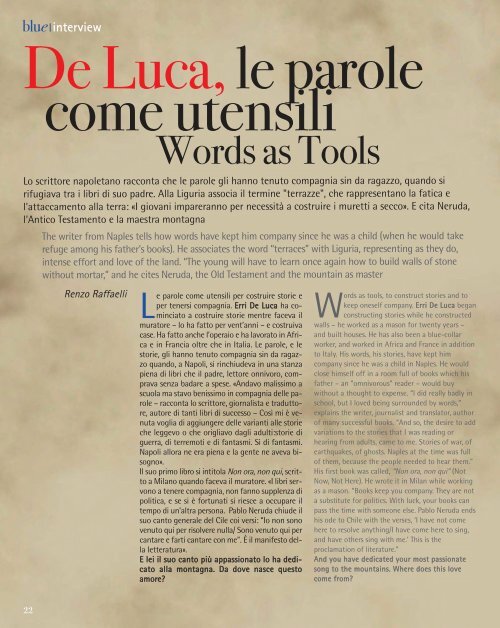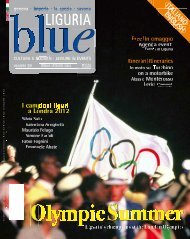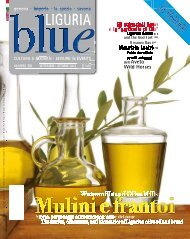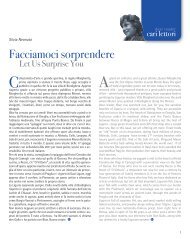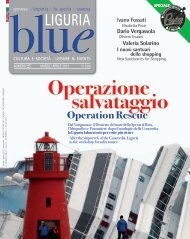BLUE NEW 31_215x270 - Blue Liguria - Sagep
BLUE NEW 31_215x270 - Blue Liguria - Sagep
BLUE NEW 31_215x270 - Blue Liguria - Sagep
You also want an ePaper? Increase the reach of your titles
YUMPU automatically turns print PDFs into web optimized ePapers that Google loves.
lue interview<br />
De Luca, le parole<br />
come utensili<br />
Words as Tools<br />
Lo scrittore napoletano racconta che le parole gli hanno tenuto compagnia sin da ragazzo, quando si<br />
rifugiava tra i libri di suo padre. Alla <strong>Liguria</strong> associa il termine "terrazze", che rappresentano la fatica e<br />
l'attaccamento alla terra: «I giovani impareranno per necessità a costruire i muretti a secco». E cita Neruda,<br />
l'Antico Testamento e la maestra montagna<br />
The writer from Naples tells how words have kept him company since he was a child (when he would take<br />
refuge among his father’s books). He associates the word “terraces” with <strong>Liguria</strong>, representing as they do,<br />
intense effort and love of the land. “The young will have to learn once again how to build walls of stone<br />
without mortar,” and he cites Neruda, the Old Testament and the mountain as master<br />
Renzo Raffaelli<br />
Le parole come utensili per costruire storie e<br />
per tenersi compagnia. Erri De Luca ha cominciato<br />
a costruire storie mentre faceva il<br />
muratore – lo ha fatto per vent’anni – e costruiva<br />
case. Ha fatto anche l’operaio e ha lavorato in Africa<br />
e in Francia oltre che in Italia. Le parole, e le<br />
storie, gli hanno tenuto compagnia sin da ragazzo<br />
quando, a Napoli, si rinchiudeva in una stanza<br />
piena di libri che il padre, lettore onnivoro, comprava<br />
senza badare a spese. «Andavo malissimo a<br />
scuola ma stavo benissimo in compagnia delle parole<br />
– racconta lo scrittore, giornalista e traduttore,<br />
autore di tanti libri di successo – Così mi è venuta<br />
voglia di aggiungere delle varianti alle storie<br />
che leggevo o che origliavo dagli adulti:storie di<br />
guerra, di terremoti e di fantasmi. Sì di fantasmi.<br />
Napoli allora ne era piena e la gente ne aveva bisogno».<br />
Il suo primo libro si intitola Non ora, non qui, scritto<br />
a Milano quando faceva il muratore. «I libri servono<br />
a tenere compagnia, non fanno supplenza di<br />
politica, e se si è fortunati si riesce a occupare il<br />
tempo di un’altra persona. Pablo Neruda chiude il<br />
suo canto generale del Cile coi versi: “Io non sono<br />
venuto qui per risolvere nulla/ Sono venuto qui per<br />
cantare e farti cantare con me”. È il manifesto della<br />
letteratura».<br />
E lei il suo canto più appassionato lo ha dedicato<br />
alla montagna. Da dove nasce questo<br />
amore?<br />
Words as tools, to construct stories and to<br />
keep oneself company. Erri De Luca began<br />
constructing stories while he constructed<br />
walls – he worked as a mason for twenty years –<br />
and built houses. He has also been a blue-collar<br />
worker, and worked in Africa and France in addition<br />
to Italy. His words, his stories, have kept him<br />
company since he was a child in Naples. He would<br />
close himself off in a room full of books which his<br />
father – an “omnivorous” reader – would buy<br />
without a thought to expense. “I did really badly in<br />
school, but I loved being surrounded by words,”<br />
explains the writer, journalist and translator, author<br />
of many successful books. “And so, the desire to add<br />
variations to the stories that I was reading or<br />
hearing from adults, came to me. Stories of war, of<br />
earthquakes, of ghosts. Naples at the time was full<br />
of them, because the people needed to hear them.”<br />
His first book was called, “Non ora, non qui” (Not<br />
Now, Not Here). He wrote it in Milan while working<br />
as a mason. “Books keep you company. They are not<br />
a substitute for politics. With luck, your books can<br />
pass the time with someone else. Pablo Neruda ends<br />
his ode to Chile with the verses, ‘I have not come<br />
here to resolve anything/I have come here to sing,<br />
and have others sing with me.’ This is the<br />
proclamation of literature.”<br />
And you have dedicated your most passionate<br />
song to the mountains. Where does this love<br />
come from?<br />
22


